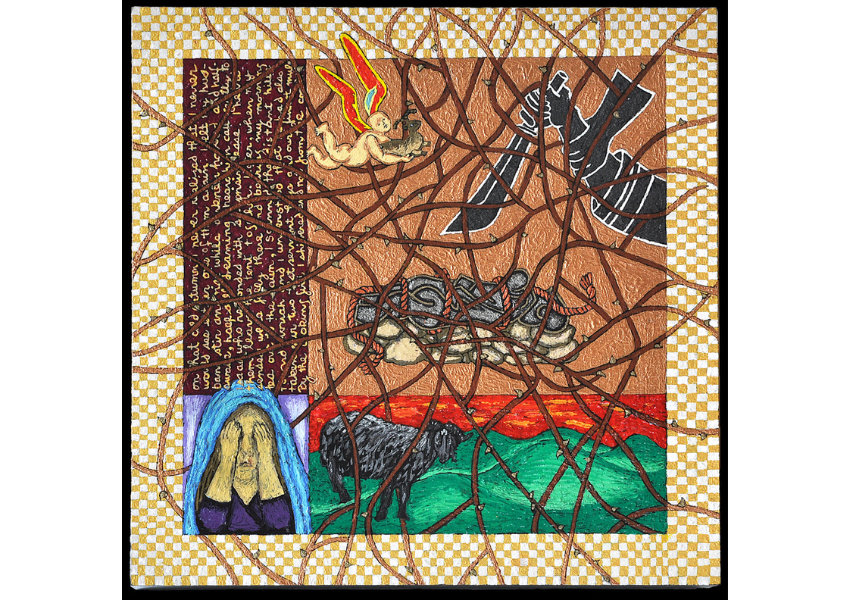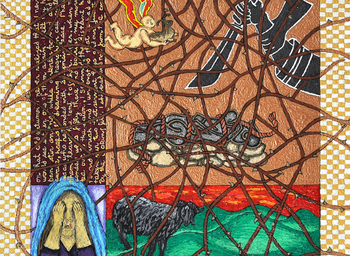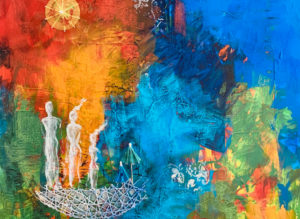An Art and Poetry Collaboration

This pairing of a poem and a painting, focused on a re-thinking of Sarah’s role as a human being in the story of the Akedah, is from an ongoing collaboration between poet Ori Z Soltes and visual artist Elaine Langerman on diverse subjects.
Sarah’s Lament
“And Abraham took the wood for the burnt-offering, and laid it upon Isaac his son; and he took in his hand the fire and the knife; and they went both of them together… and Abraham dwelt in Beersheba… And Sarah died in… Hebron… and Abraham came to mourn for Sarah, and to weep for her… and… buried Sarah, his wife, in the cave of the field of Machpelah…” — Gen 22:6, 19 and 23:2, 19.
On that cold autumn morning,
I never realized
that I would never see
my Abraham again.
I felt my husband
stir and rise
while darkness hovered,
and, half-awake,
half still dreaming,
I heard him call
gently
to Isaac,
who responded with surprising
ease,
and I heard them
leave the tent, together.
Later, when my senses
were fully there
and bearing
my morning tea
out to the dawn,
I scanned
the distant hills
toward Moriah,
and I understood
that he had also taken
our two best
servant boys
and our finest mule.
By the cooking fire
I shivered,
and not from the cold,
when I saw
the empty space
where my sharpest,
largest kitchen knife
was no longer
bound in its place.
Too many days later,
toward evening,
one of the boys arrived
as a messenger
from my husband,
to inform me
that all was well
with him
and with Isaac,
my son,
safe, after events
that even the lad
who waited patiently
at the foot of the mountain,
could only surmise.
Father and son, together,
offered a ram,
it seems,
to the mighty God,
the invisible force,
the voice
that has commanded
Abraham
since before we were wed.
My son
is safe
with his father,
in Be’ersheva,
the messenger reported.
Yet, as suddenly
I have begun to feel
the weight of my years,
I find myself
consumed by questions.
Four, to be precise:
What really happened
on that mountain peak—
so awful that my husband
never returned to me?
How have he and Isaac fared,
after that moment,
without my mediating
presence to
bind them
together?
Will I see them again,
ever,
before some cave-like
burial site
swallows me?
Is all the pain
that I have felt
since that fateful dawn—
forgotten by Abraham
who once thought me
so beautiful,
that he shamed himself
before
the pharaoh in Egypt;
torn from my beloved Isaac,
my song and my laughter,
my one
and only son,
whom I love
as far as the farthest star
and back again
—as fully as the desert
is full of sand:
is my pain a punishment
sent from my husband
and his God
for forcing Abraham
to send away
that Egyptian handmaiden,
Hagar,
and Ishmael,
her son?
Ori Z. Soltes teaches at Georgetown University across a diverse range of disciplines.
Reflections
Reading between the lines
How does the Midrash handle the Akedah? Where is Sarah in the rabbinic discussion?
Taking the Torah IRL
Why is it intriguing and important to think about the biblical patriarchs and matriarchs not only as heroes and heroines but as everyday people?
Analyze
Given the previous question: why might Abraham not have returned to Sarah after the Akedah? He never saw her alive again. What was he afraid of?
Want more?
Get curated JewishArts.org content in your inbox



